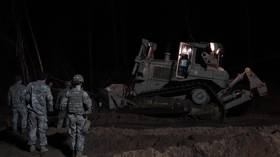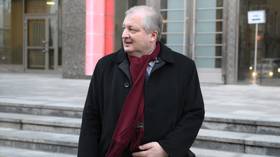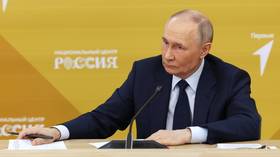Getting off to a re-START: Russia-US sign historic deal
Taking a step toward a nuke-free world, Presidents Dmitry Medvedev and Barack Obama have signed a crucial arms-control treaty cutting Russian and American strategic nuclear arsenals by about a third.
Having managed to overcome major sticking points during months of negotiations over the deal, the leaders of the two largest nuclear powers arrived in the Czech capital, Prague, for the signing ceremony. Prior to the event, Obama and Medvedev met for narrow format talks.
The new agreement replaces the 1991 Strategic Arms Reduction Treaty – known as “START” – which expired on December 5, 2009.
The so-called “new START” reduces the possession of both states’ stockpiles over seven years to 1,550 warheads each, which is about 30 per cent less than the 2,200 allowed by the previous agreement.
Also, according to the deal the number of deployed ballistic missiles should not exceed 700 and deployed and non-deployed ICBM launchers, and 800 SLBM launchers and heavy bombers. The number of delivery vehicles will be reduced by more than a half.
After the ceremonial signing event at the Prague Castle’s Spanish Hall, Medvedev and Obama addressed the media at a joint conference.
Read President Medvedev's statement after signing the treaty (full text)“First step on a longer journey”
In his speech, the US president thanked the Russian leader adding that “without his personal efforts and strong leadership we would not be here today”.
“We have met and spoken by phone many times throughout the negotiation of this Treaty, and as a consequence we have developed a very effective working relationship built upon candor, co-operation, and mutual respect,” he said.
A year ago, also in Prague, Obama laid out an ambitious plan to free the world of nuclear weapons.
“I said then – and I will repeat now – that this is a long-term goal, one that may not even be achieved in my lifetime. But I believed then, as I do now, that the pursuit of that goal will move us further beyond the Cold War, strengthen the global non-proliferation regime, and make the United States, and the world, safer and more secure,” he said. “One of the steps that I called for last year was the realization of this Treaty, so it is very gratifying to be back in Prague today.”
The American leader reminded of the commitment when he came to office to “reset” relations between Moscow and Washington which “had started to drift, making it difficult to co-operate on issues of common interest to our people”.
“Together, we have stopped the drift, and proven the benefits of co-operation,” he said. “Today is an important milestone for nuclear security and non-proliferation, and for US-Russia relations. It fulfills our common objective to negotiate a new Strategic Arms Reduction Treaty.”
According to the American president, the signing of the new treaty “demonstrates the determination of the United States and Russia – the two nations that hold over 90 per cent of the world’s nuclear weapons – to pursue responsible global leadership.”
“Together, we are keeping our commitments under the Nuclear Non-Proliferation Treaty, which must be the foundation of global non-proliferation,” he added. However, even though the new deal is “an important step forward, it is just one step on a longer journey.”
Obama expressed that he hopes to “pursue discussions with Russia on reducing both our strategic and tactical weapons, including non-deployed weapons.”
A win-win situation – Medvedev
Dmitry Medvedev, giving his remarks right after the ceremony, also thanked the American leader for “this successful co-operation in this very complex matter and for the reasonable compromises that have been achieved.”
“I fully agree with the assessments that have just been made by my colleague President Obama concerning the fact that here, in this room, a truly historic event has taken place,” he said.
“When we worked, we aimed at the quality of the treaty, and indeed the negotiating process has not been simple, but our negotiating teams have been working and held professional constructive way. That has been non-stop work 24 hours a day, and that helped us do what just a couple of months ago looked like mission impossible,” Medvedev noted.
As a result, he said, “we obtained a document that in full measure maintains a balance of interests of Russia and United States of America.”
What matters most, he stressed, “is that this is a win-win situation – no one seems to lose from this agreement.”
“I believe this is a typical feature of our cooperation – both parties have won. And taking into account this victory of ours, the entire world community has won. This agreement enhances strategic stability and at the same time enables us to rise to a higher level of cooperation between Russia and the United States. And although the contents of the treaty are already known – let me point out once again what we have achieved, because this is very important,” Medvedev said.
Differences remain on missile defence
A sore point in the relations between the two powers – Washington’s planned missile defense in Europe – is still something the two sides have not found common ground on.
The two sides, though, agreed to expand discussions on the issue. Both presidents expressed hope that they will be able to overcome their disagreements in order to continue the reduction of nuclear arsenals.
This, Obama said, “will include regular exchanges of information about our threat assessments, as well as the completion of a joint assessment of emerging ballistic missiles.”
“And as these assessments are completed, I look forward to launching a serious dialogue about Russian-American co-operation on missile defense,” he added.
Barack Obama reiterated that the US anti-missile system was not aimed at “changing the strategic balance between the US and Russia, but was instead directed at protecting the American people from potentially new attacks from missiles launched by third countries.”
America’s commander-in-chief added that he recognized Russia’s concern on the issue and expressed readiness for dialogue. He stressed that the trust that would allow US and Russia to move “forward in a constructive way” is built.
“I am actually confident that moving forward, as we have, this discussion would be part of a broader set of discussions about… for, example, how we would take tactical nuclear weapons out of theater, the possibilities of us making a more significant cut not only in deployed but also undeployed missiles. There’s a whole range of issues we can make significant progress on. I am confident that this is an important step in this direction,” the US President added.
Dmitry Medvedev admitted that the US missile defense issue was one of the most difficult during the work on START treaty, but added that “at this moment the language used in the treaty satisfies both parties.”
“We appreciate the steps the current US administration has made concerning the missile shield as the decisions the previous administration came up with on the issue hampered the negotiations progress,” he said. “This doesn’t mean we don’t have differences, but we have the will and desire to work on this issue. We have offered the US our assistance in creating a global missile defense system. This is something we have to consider, keeping in mind the vulnerability of our world and the possibility of terrorists using nuclear weapons,” the Russian president said.
Dmitry Medvedev added that he shares his counterpart’s optimism on further negotiations.
“We believe – and our American partners are well aware that this is our open position – that the treaty can be viable and can operate only provided there is no qualitative or quantitative increase in ABM-capabilities, something that could, in the final analysis, jeopardize the strategic offensive weapons of the Russian side. This is the gist of the statement made by the Russian Federation in connection with the signature of this treaty,” Medvedev noted.
Ratification – yet another challenge
The major part of work on the treaty, including its signing, has been done. However, now another concern arises over whether the document will be ratified by the national parliaments.
“I look forward to working with the United States Senate to achieve ratification of this important Treaty later this year,” Obama said.
President Medvedev noted that it is also important to synchronize the ratification process.
“As I understand, our American partners intend to submit the document to the Senate for ratification as soon as possible. We also will be working with our Federal Assembly to maintain the necessary dynamics of the ratification process,” the Russian head of state assured.
Later, answering journalists questions on the issue, Medvedev started answering by saying that he had an impression that his American counterpart thought that Russian side would have more problems with the ratification. “And perhaps this is the case,” Dmitry Medvedev said.
When talking about the conditions necessary for the treaty to pass the Russian parliament, the Russian President reiterated that neither of the parties must have its interests infringed and thus the process of submission of the documents to the parliaments must be simultaneous. The most important thing is to prevent the situation when one side has already ratified the treaty and the other is still lingering. If such situation is prevented, Russia will have no problem with ratifying the treaty, the Russian President concluded.
The US President said that as the law obliges the US Senate to review any international treaty prior to ratifying it, the text of the treaty will be submitted to all appropriate senate members and committees, but also it will be published on the Internet both in the USA and in Russia, so that the text can be studied by the general public. When this is done, everyone will discover that the new treaty is well-crafted and meets the interests of both parties and the world as a whole which in turn would lead to its speedy ratification.
Tehran not responding to constructive proposals – Medvedev
Speaking of non-proliferation, not surprisingly, both presidents touched upon the Iranian nuclear program that has long been an issue of concern for the entire international community.
“Those nations that refuse to meet their obligations [under the Nuclear Non-proliferation Treaty] will be isolated, and denied the opportunity that comes with international integration,” Barack Obama said in his speech. “That includes accountability for those that break the rules; otherwise the NPT is just words on a page,” he noted.
“That is why the United States and Russia are part of a coalition of nations insisting that the Islamic Republic of Iran face consequences, because they have continually failed to meet their obligations. We are working together at the UN Security Council to pass strong sanctions on Iran. And we will not tolerate actions that flout the NPT, risk an arms race in a vital region, and threaten the credibility of the international community and our collective security,” President Obama stated.
The Russian leader said that, “Regrettably, Tehran is not responding to a whole range of constructive proposals, compromising agreements.”
“We cannot turn a blind eye to this,” he added. “Therefore, I do not rule out the possibility that the UN Security Council will have to review this issue once again.”
Russia’s position, Medvedev said, is well-known: “sanctions by themselves seldom lead to any results, although it is difficult to do without them in certain situations”. The president has underlined that sanctions should be “smart” and not aimed not against the Iranian population.
“We will keep looking at steps that our partners are taking. In any case, we will use political and diplomatic methods, developed by the 5+1 group [the UN Security Council's 5 permanent members and Germany]. Naturally, the discussion of these issues will continue” Medvedev said.
“Let's ask ourselves what we need sanctions for? Is the purpose just to get satisfaction from repressing this or that state?” he questioned. “We need sanctions because we want to motivate a person or a state to act legally, according to the commitments that this state has taken upon itself.”
His American counterpart said that, “Discussions about sanctions on Iran have been moving forward over the last several weeks; in fact they have been moving forward over the last several months.”
”We are going to start seeing some ramped up negotiations taking place in New York in the coming weeks. My expectations are that we are going to be able to secure strong, tough sanctions on Iran this spring,” Obama said.
According to the American leader, “There are two ways in which these START negotiations have advanced, or at least influenced Russia-US discussions on Iran.”
“President Medvedev and I have been able to build up a level of trust and our teams have been able to work together in such a way that we can be frank, we can be clear, and that helped to facilitate our ability to work together jointly to present to Iran reasonable options that would allow it to distance itself from nuclear weapons,” he said.
“What we have seen from the start is that a host of countries have said to Iran that we are willing to work through diplomatic channels to resolve this issue, but unfortunately Iran has consistently rebuffed this approach. And I think that Russia has been a very strong partner in saying that it has no interest in bringing down the Iranian society or government but it does have an interest as we all do in making sure that the country is following its international obligations,” Obama added.
The Russian leader told the audience that today he and his American counterpart “had a very frank, simple, open discussion on what we can do and what we can't do.”
“I can tell you frankly that I have presented how far we can go as far as sanctions are concerned. And I said when the decision is made, I as president of Russia will proceed from two things. First of all, the need to motivate Iran to act according to international law. Secondly, my having to act based on the national interests of my country,” Medvedev stated.
We should be careful about our relations – Medvedev
Winding up his speech after the signing ceremony, Barack Obama once again expressed his condolences over the recent terrorist attacks in Russia. “We will remain steadfast partners in combating violent extremism,” he affirmed.
While security and non-proliferation are the issues of top priority for the two states, “they are only one part of the US-Russia relationship,” Obama said.
“We also discussed the potential to expand our co-operation on behalf of economic growth, trade and investment, and technological innovation, and I look forward to discussing these issues further when President Medvedev visits the United States later this year. Because there is much we can do on behalf of our security and prosperity if we continue to work together,” he said.
President Medvedev expressed the same view, saying that, “There are many things that bring us together with the USA.”
“We are open to co-operation and we would like to use American experience. There are issues in energy and transport. There are many economic projects that we can consider,” he said. “It’s important for us to make every effort for the people in our two countries to understand each other better, to respect each other and follow the best patterns of American and Russian culture. People should not consider each other as enemies because of the information that is sometimes in the media. We should be more careful about our relationship, only then will our relationship be good, and I expect this will be the case.”
Read also – Russia and USA Give a Start to New START













